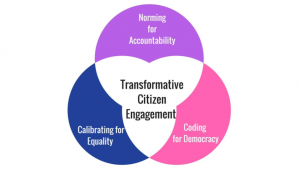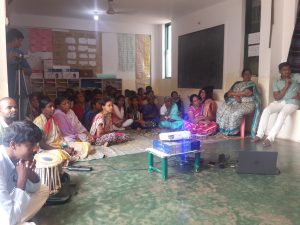Digital Rights, Development & Democracy
Exploring the intersections of digital rights debates with older debates in development and democracy is a critical area for our research, advocacy and field-building efforts. We are interested in expanding the scope of digital rights debates to include economic, social and cultural rights and right to development issues, in addition to civic-political liberties. A democratic governance framework for digital society, we believe, must further a rights approach that upholds the indivisibility and inter-dependence of rights. Recognizing the ways in which the digital is remaking democracy as we know it, our work this year focussed on understanding how processes such as datafication and algorithmic decision making impact electoral processes, citizen engagement, grievance redress and citizen rights.
Research
Voice or chatter

The ‘Voice or chatter?’ project, which was launched in March 2016 was successfully completed as part of our collaboration with the Making All Voices Count Consortium – a four year global research and advocacy grants program examining the role of technology in enhancing civic engagement. The study adopted interpretive approaches to explain the shifting terrain of governance in these times of flux, drawing attention to policy issues and governance practices that matter for meaningful citizen engagement. The final synthesis report, which came out of the eight study multi-country research project, titled ‘Voice or chatter? Making ICTs work for transformative citizen engagement’ was released in July 2018. The report was very well received in academic and practitioner networks, and to date, continues to be one of the most read reports on the MAVC website, reaching over 3,800 downloads as of date. As part of the dissemination of this report, the IT for Change team also participated in a global webinar organized by MAVC and the Global Partnership for Social Accountability (GPSA) knowledge platform where we presented the findings from the research to 60 development scholars, practitioners and policy actors.
Spoorti
In March 2018, we launched a new action research project with urban youth – ‘A spatial data system for the inclusive cities agenda’, supported by the United Nations Democracy Fund (UNDEF). IT for Change is excited to be partnering with two Bengaluru based organizations – Center for Study of Science, Technology and Policy (CSTEP) and the Association for Voluntary Action and Service (AVAS) – to create a proof-of-concept community data model for grievance management in the areas of Water, Sanitation and Health. The project is a demonstration of a community owned and community driven data process, which we believe is an important step to demonstrate the power of ‘small data’. The two year project will be implemented in G. Baiyappanahalli and train young men and women not only to use the platform, but also to mobilise the community and take forward AVAS’ work in the area through a digitally rebooted strategy. Making digital literacy meaningful and contextual is a key vision of the project.

We have recruited 24 youth – young men and women – as data and information stewards for the project. In the year ahead, we will be undertaking a series of socio-technical trainings and engage with the community and the stewards to explore how a community-led grievance system can interface with the architectures of e-governance. With this project, we are expanding our community based intervention into the space of urban governance and civic engagement.
Privacy and data protection in India
We have been closely studying the privacy and data protection debate in India, following the Aadhaar / unique citizen ID project and the public consultations organized by the Justice Srikrishna Committee around the personal data protection bill. We have advocated for framing privacy as a ‘positive right’, casting the spotlight on the connections between surveillance capitalism and the threat of unwarranted intrusions on one’s privacy. We are also attentive to the importance of broadening the definitions of personal harm.
We elaborated these ideas in a series of articles that we authored for the First Post and The Hindu. We also responded to the call for inputs by the Office of the High Commissioner for Human Rights on human rights challenges relating to the right to privacy in the digital age.
We have also been working closely with social movements – Mazdoor Kisan Shakti Sangathan, MAKAAM, and other coalitions who are keenly following the Aadhaar debate – to explore shared concerns and positions on development and democracy in the context of pervasive datafication.
We have taken our perspectives to many forums at national and global levels, and have been invited to comment on policy and regulatory aspects and make theoretical and academic contributions.
Events and advocacy
National
- In September 2017, Amrita Vasudevan spoke at a panel at the Digital Citizen Summit at a panel on ‘Regulating search engines: Competition, free speech and human rights.’
- In February 2018, Anita Gurumurthy was invited to hold a session on media, knowledge and development by the Department of Political Science, University of Delhi at the Round Table conference organized as part of their ICSSR research program on ‘Knowledge, development and politics in post-colonial India: Contestations in state, market and civil society.’
- In March 2018, Deepti Bharthur was a panelist at the 14th Annual National Conference on Electoral and Political Reforms on 10 March 2018 at the session on ‘Information and communication technology for better governance.‘
Global
- In December 2017, Anita Gurumurthy delivered a video lecture on ‘Improving public service delivery and promoting inclusion through innovation and ICTs at the symposium on ‘Building effective, accountable and inclusive institutions and public administration for advancing the 2030 agenda for sustainable development’, organized by the Project Office on Governance (UNPOG), in collaboration with the Government of the Republic of Korea.
- As part of our engagement with the global research network, Development Implications of Digital Economies (DIODE), Anita Gurumurthy and Parminder Jeet Singh attended meetings in Oxford and Manchester in 2017 and 2018, where they presented on the issue of digital trade justice.
- We attended the UN Internet Governance Forum, in Geneva, in December 2017 where we organized and participated in a number of workshops, and were invited to be part of a main session titled ‘Empowering global cooperation on cybersecurity for sustainable development & peace.’
During the year, we also worked intensively to seek funding for our new lines of work examining the digital restructuring of democracy and expand research efforts in this direction. We were shortlisted for the highly competitive IDRC South Asia Cyber Policy Think Tank bid, although we didn’t make it to the final list. In addition, we worked closely with researchers around the part of a massive international consortium to develop a proposal bid on a global Digital Inequalities Hub for the UK research councils Grand Challenge 2018. The process, an invaluable learning experience for us, has helped us build new repertories and capacities within our organization, as we recognize the changing nature of funding and the rising importance of collaborations, networks and alliances.
Plans for 2018-19
In 2018-19, we will continue to make our presence felt across global networks, venues and platforms. We have been invited to academic and key global institutions as experts on the data connection to development and democracy. Some notable events we will be speaking at include, ‘Digital rights in Asia’ conference in April 2018, organized as part of a Sydney Research Excellence Initiative (SREI)-funded project on Digital Rights in Australia and Asia, and the Conference on ‘Data justice’ organized by the Data Justice Lab, Cardiff University in May 2018 where Anita Gurumurthy will be delivering the keynote.
One of the key international forums we will be attending this year is the RightsCon Summit in Toronto in May 2018. Along with several panels and sessions we will be participating in, we will also be organizing, as part of the Just Net Coalition, a satellite event titled, ‘Contending with the digital horizon – What next for social movements?’ on Day ‘0’ of the event. The event is aimed at brokering a dialogue between actors from social movements and members of the digital rights community and will explore the possibility of creating common pathways for data and digital justice. We see this as an important opportunity to shape the debate and create new points of departure in mainstream conversations on digital rights
In 2018-19, we plan on expanding our footprint in the area of digital democracy through concerted research and advocacy tracks at the national and global levels. To this effect, we have been developing and working to raise funds to support our work in this domain and have been in talks with various funding organizations.
One of the critical expansions we will be making in the year 2018-19 is setting up an online media space on technology justice. We have recognized for long that Southern voices, perspectives and theories of global justice in a digital age have been missing from digital rights debates though the global South is often the battleground where these questions manifest themselves most deeply. To address this need, we reached out to several organizations across different regions to build the basics of a proposal for an online media space that can become a ‘go-to’ place for these intersections and also tackle other cross-cutting digital issues such as algorithmic and data justice. We hope to build on this momentum and find the resources to launch this media space in 2019.
